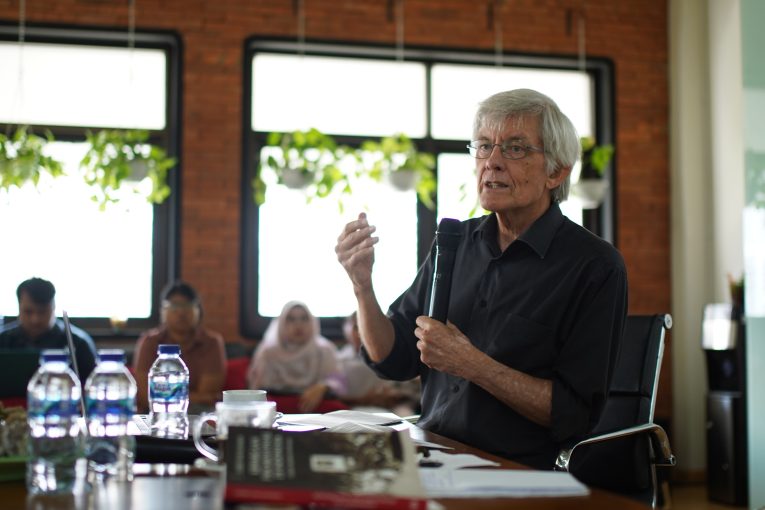
Yogyakarta, August 16th 2023─The Research Center of Politics and Government (PolGov) of the Department of Politics and Government held a book review at Fisipol’s Big Data Lab on Wednesday (16/08/2023). This activity discussed the book by Prof. Gerry van Klinken entitled “Postcolonial Citizenship in Indonesia”. This discussion took place mixed by presenting Prof. Gerry van Klinken as the author of the book; lecturer at the Department of Politics and Government (DPP); PolGov Researcher; as well as participants open to the public. Amalinda Savirani as a DPP Lecturer also had the opportunity to provide a discussion related to the topic of the book. Guided by the moderator, Mahesti Hasanah, the discussion on this book review focuses on discussing local democracy and citizenship studies.
Klinken opened the discussion by telling the tragedy of the death of a political activist named Jan Djong in Maumere Prison. Jan Djong, who vocally voiced citizenship issues, was considered to have rebelled against the regime. The demonstration was deliberately carried out by several political activists in Maumere who had hopes for wealth, glory, and freedom from binding royal rules. This is motivated by the culture of transformation of colonial society which inherited several royal rules. History has recorded that the Maumere region was once the center of civilization for the Sikka Kingdom.
“Where there is a king, it means there is colonialism, there is slavery. The (power) of the King is a remnant of Dutch colonialism, while the new republic is bigger than the Kingdom of Sikka,” said Klinken. This argument was in line with the concept of citizenship, which at that time was immature and influenced by conservative institutions. Figures who are active in demonstrating, such as Jan Djong, also need to be removed so that various old rules continue to apply. Thus, the channel of democracy at that time became clogged.
Apart from the tragedy, Klinken also said that this book contains several criticisms related to citizenship studies. For example, criticism from Engin F Isin argues that the curriculum in schools generally teaches the definition of citizenship as a membership. The citizenship of a new citizen will be considered valid if he has a membership identity card such as an Identity Card (KTP). However, the static meaning of citizenship creates political limitations. Whereas citizenship studies can be realized dynamically by involving the active participation of every stakeholder. Therefore Klinken said, “Rebellion (in citizenship) in a different form is a form of active citizenship modality.”
Furthermore, Amalinda gave a response through the findings from her reading. There are two dimensions attached to the book written by Klinken. First, the temporal dimension takes the perspective of the birth of local elites to control access to state resources. Second, the spatial dimension specifically highlights the phenomenon of the patronage structure in Maumere. On the other hand, Amalinda questions how the relationship between citizens and the government tends to sue the state, “Complaining to social media is our new way to criticize static citizenship studies.”
